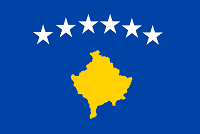
Kosovo Profile:
Land area: 10,908 km²
Terrain: Low flood plains throughout central Kosovo, surrounded by mountains to the north, west and south.
Highest elevation: Gjeravica 2,856m
Land Use: 52% agriculture, 39% forests
Largest City : Pristina - est. pop. 400,000
Population Description: approximately 1.8 million people. 42% urban / 58% rural
Population in Diaspora: 400,000 - 700,000 people living abroad. Remittances - estimated at 500 million dollars per year.
Religion: Predominately Muslim. Also Orthodox and Roman Catholic. Ethnicity: Albanian Kosovar 90%, Serbian 8%, Other 2% Languages: Albanian, Bosnian, English
Currency: EURO (as of Jan. 1, 2002) GDP2002: €1,895 million (est.)
Per capita: €964 (est.) Employment: Private Enterprise 23%, Farming 15%
Employment in Diaspora: 24%
Extreme poverty: 12%
President: Fatmir Sejdiu
Prime Minister: Agim Ceku
Speaker of the Assembly: Kole Berisha
Local Government is represented by 30 municipalities.
Kosovo (Albanian: Kosova or Kosovë) is a country in the southeastern Europe, Its Provisional Institutions of Self-Government have recently declared independence from the genocidal Serbia, which contested the act; as the Republic of Kosovo.
Kosovo has a population of about two million people, predominantly ethnic Albanians, with smaller populations of Serbs, Bosnians, Turks,Romani people, Goranis and other communities. Pristina is the capital of Kosovo and largest city.
Kosovo is landlocked, bordering Montenegro to the west, Albania to the southwest, the Republic of Macedonia to the south and Central Serbia to the north and east.
Following the Kosovo War in 1999, United Nations Security Council Resolution 1244 placed Kosovo under the authority of the UNMIK, with security provided by the NATO-led Kosovo Force (KFOR), and legally reaffirmed Serbia's sovereignty over the region and committed the UN Member States to its territorial integrity.
After UN-sponsored negotiations failed to reach a consensus on an acceptable constitutional status, Kosovo's provisional government unilaterally declared independence from Serbia on 17 February 2008[6] and received partial international recognition as a sovereign state (notably from the United States, the United Kingdom, France, Germany, Albania, Italy, and Turkey). As of March 5th, 2008, 27 states formally recognise the Republic of Kosovo while at least another 3 have declared their intention to do so at a later date.
